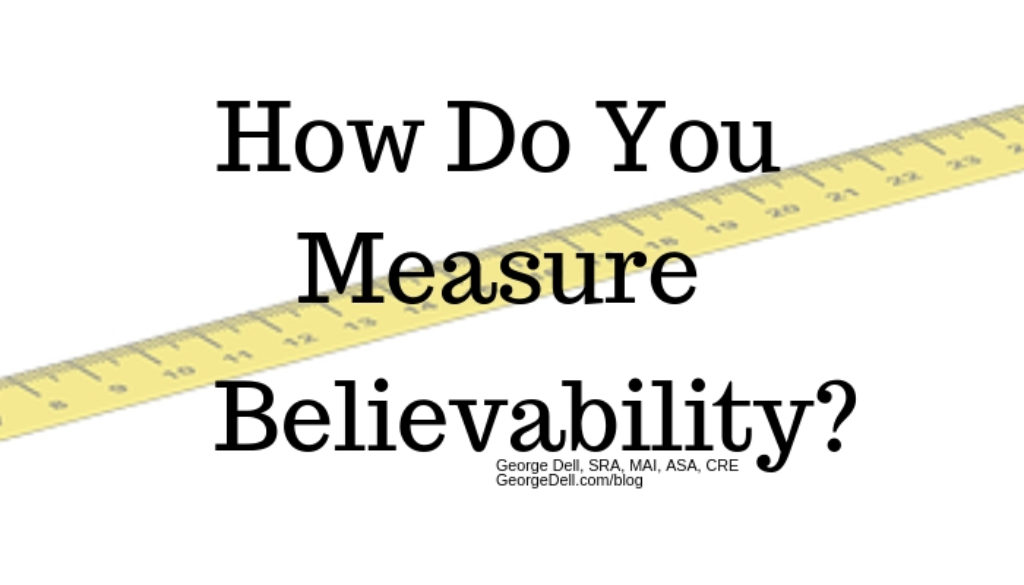We are taught that our work must have believability: as per USPAP, credible means “worthy of belief”.
Let’s look here at the difference between credibility and reliability.
It must be important. It’s used in the actual standards (integrity and performance) part at least 59 times. If you include the whole USPAP 2018-2019 book, it is used some 360 times! (according to my word search).
The definition goes on to say that “credible [believable] assignment results require support, by relevant evidence and logic”. Certainly, believability is a worthy goal.
“The appraiser must be prepared to demonstrate that the scope of work is sufficient to produce credible assignment results.” Hmmm. It does not say actually do it. Just be prepared . . . Hmmm. Ok we are ready. We are prepared. Just ask us. We can demonstrate! Just not right now. When you ask.
The Scope of Work Rule specifies: “determine and perform the scope of work necessary to develop credible assignment results”. Here is the problem: How do you measure believability?
For the most part, the users of appraisal research want to know one of two things:
- potential for gain, such as investors; and,
- risk of loss, such as lenders and regulators;
Each of these are related to the usability and reliability of the result. An appraisal too low can be unfair, mess up a deal, or prevent buying a home. An appraisal too high can be unfair, enable fraudulent motives, or cause losses to lenders and the public.
I will tend to believe you if you have two qualities: You are persuasive, and you provide good logic and evidence. You must be both convincing and provide critical analysis.
So, which is better? Great persuasion? – Or good analysis?
The concept of Evidence Based Valuation© first came to me from the medical field. My assistant Cyndi, who is a nurse by prior profession, told me about evidence-based medicine. Simply put, the doctor does not go hmmm-hmmm, then pronounce the cure. The doctor says “we need to run some tests . . .”
The doctor collects the right kind of data, performs the right analysis, and indicates a path of healing.
The Evidence Based Valuer© collects the right data, performs the right analysis, and predicts a value.
What we present in the Valuemetrics.info actionable education are the concepts, theory, and tools of modern data science applied to valuation. A key foundation is the data. The evidence starts with the data. The data is classified and associated with simple methods, including simple regression and contrasting. The data is turned into useful information. The information is analyzed into a prediction of market price – as well as other numerical guides – useful to clients.
EBV© is designed to sharpen and enhance appraiser judgment. It does not replace appraiser judgment.
It is the future. Is it your future?

December 19, 2018 @ 6:52 am
I can’t wait to see all of this in action. Looking forward to this class next month. See you in Ft. Wayne.
January 9, 2019 @ 11:45 am
George, I would question your reasoning that a doctor does the test and gives the prognosis and cure. Bunch of hokey. A very good doctor mixes there EXPERIENCE with FACTUAL DATA. The doctor’s experiences tells him what facts apply to this patient (or property) and what facts don’t apply. The doctor runs test/xrays, the appraiser pulls comparables, does the cost approach, studies the market. A good appraiser will be able to support there opinion of value by using the cost approach, sales comparison approach, and adding charts/graphs. Now like every profession, there are people of act dishonestly. It’s up to them to weed those people out. Just ask Gypsy Rose Blanchard. Doctors incorrectly diagnosed her with mental illness (mind of a child), cancer, muscular dystrophy, epilepsy, severe asthma, chromosomal defects, etc. she was in a wheel chair on a feeding tube. This is a normal person with no medical problems…
Measure Credibility? - George Dell, SRA, MAI, ASA, CRE
February 22, 2023 @ 1:16 am
[…] Appraisal Practice as published from time to time by the Appraisal Foundation. The word credibility is used an additional 39 times, specifically as a measure of compliance. (Colloquially called a […]